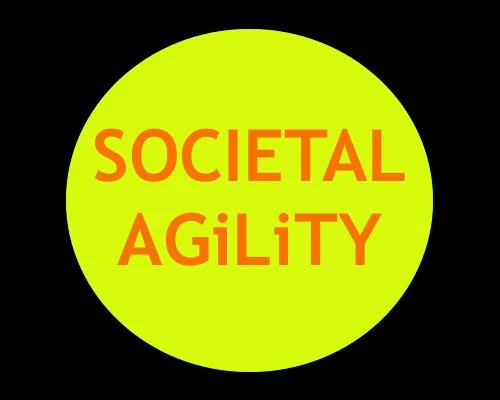What Societal Agility Looks Like: From Cultural Shifts to Grassroots Practice
A framework for culture shift, systems change, and citizen-powered transformation
In January 2025, I sat with a group of young people in the Baqa’a refugee camp in Jordan. When we began the day, many of them had internalised the belief that even a basic job was out of reach — let alone starting their own venture.
But by the end of the session, they were crafting business pitches, exploring team dynamics, and reimagining their place in the world.
And this shift isn’t unique to Baqa’a. I’ve witnessed the same transformation — often within a single day — among young people in Karachi, Sana’a, and London. The spark is there everywhere. All it needs is the right conditions and the right enablement to ignite.
What changed?
Not their circumstances, but their mindset, their sense of agency, and their understanding of social conditions around them. That’s the quiet power of what I call Societal Agility.
Why Societal Agility Matters Now
In my last post, What MAGA Reveals About a Broken Democratic Order, I reflected on how democratic systems are increasingly misaligned, not just politically, but culturally. Rituals continue, but purpose is hollowed out. Citizens are sidelined. Institutions serve markets more than people.
And yet, this isn’t a problem we solve through reform alone. It’s a problem of behaviour, culture, and how we show up in the systems we’re trying to change.
That’s where Societal Agility comes in, not as a theory, but as a practice. A cultural capability we need to co-create more adaptive, inclusive, and people-serving systems.
The Societal Agility Shift Model
Five cultural shifts for systemic transformation
1. From Delegation → To Participation
When people are excluded, society stagnates. When they’re included, it moves.
Adaptive societies invite citizens to shape direction, not just cast votes.
Think citizen assemblies, participatory budgeting, grassroots-led initiatives.
Power must be shared, not outsourced.
2. From Debate → To Dialogue
Debate wins points. Dialogue builds futures.
Agility requires deep listening, collective sensemaking, and the courage to hold nuance.
We need spaces for reflection, not just reaction, for stories, not just soundbites.
3. From Perfection → To Experimentation
Complex challenges aren’t solved with five-year plans — they evolve through learning.
Adaptive societies test, iterate, and adapt in real time.
This means embracing small experiments, micro-pilots, policy prototyping — and the humility to say, “We’re still learning.”
4. From Control → To Trust
Control constrains resilience. Trust unlocks it.
Adaptive transformation needs transparency, decentralisation, and distributed leadership.
When we build trust — between citizens, institutions, and each other — we unlock capacity far beyond any top-down mandate.
5. From Defending → To Learning
In a fast-changing world, ideological rigidity is a liability.
Societal agility is about evolving beliefs and practices through reflection, not defensiveness.
It’s about building feedback-rich systems that grow with their people.
This Isn’t Just Theory — It’s Practice
These shifts aren’t abstract ideals. They’re already being lived out in communities around the world, including through the work of Peace Through Prosperity in communities, ChangeCraft.io in enterprises, and Better-Gov at a policy level.
Since 2010, with my teams in Pakistan, Egypt, and Yemen, we’ve been exploring what societal agility looks like from the ground up — delivering grassroots enablement programmes for micro-entrepreneurs, drawing on agile principles, systems thinking, and behavioural science. These programmes have supported individuals in building financial resilience, growing micro-businesses, and fostering self-reliance across underserved communities.
Societal Agility for the Next Generation
In 2024–25, we extended this approach to university students, exploring what societal agility looks like in a different context — helping youth develop systems awareness, collaborative leadership, and entrepreneurial mindsets to navigate a complex world.
In Jordan and Türkiye, we’ve prototyped this work, adapting the same principles to meet local contexts.
In Jordan, we’ve seen youth move from resignation to leadership — through structured coaching, agile training, and value-creation workshops.
In Türkiye, we’re enabling young professionals to unlock creativity, leadership, and economic agency through culturally rooted skill-building accelerators.
Across all of these programmes, our focus isn’t just skill-building — it’s about cultivating the conditions for self-organisation, economic resilience, and collective impact.
This is what happens when transformation starts within the system — not from above it.
From Experiment to Ecosystem
These are just early prototypes — living models of what’s possible.
But they raise powerful questions for anyone serious about system change:
What if policy wasn’t just designed for people, but with them?
What if governance was built on trust, adaptability, and community intelligence?
What if we stopped defending old structures — and started learning toward better ones?
This is not a finished model — it’s a growing practice. One we’re still learning our way into.
A Community Invitation
If this resonates, I’d love to connect with others working at the edges; practitioners, policymakers, think tanks, community builders, funders, and institutions.
Let’s learn together. Let’s build prototypes. Let’s start small, impact large, and keep it sustainable.
Reach out if you'd like to explore how we might collaborate.
And stay tuned: I’ll soon be sharing simple, practical exercises for you to experiment with. These are designed to help you explore the Five Cultural Shifts for Systemic Transformation in a hands-on way.
Because understanding is one thing — but practising agility is where the change begins.
Thanks for reading. If you’re new here, I’m Kubair Shirazee, I help people, teams, organisations and communities navigate past the status quo and explore better ways of collaborating and delivering impact.









